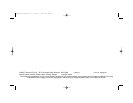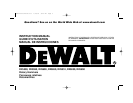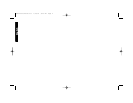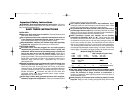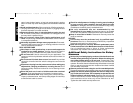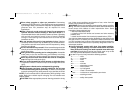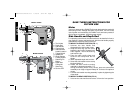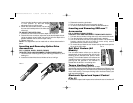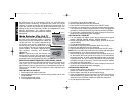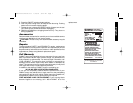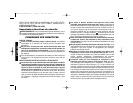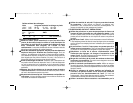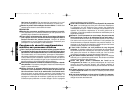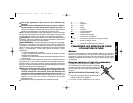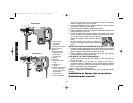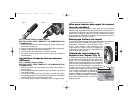
3
English
Wear safety goggles or other eye protection. Hammering
operations cause chips to fly. Flying particles can cause permanent
eye damage. Wear a dust mask or respirator for applications that
generate dust. Ear protection may be required for most
applications.
Keep a firm grip on the tool at all times. Do not attempt to
operate this tool without holding it with both hands. It is
recommended that the side handle be used at all times. Operating
this tool with one hand will result in loss of control. Breaking
through or encountering hard materials such as re-bar may be
hazardous as well.
Do not operate this tool for long periods of time. Vibration
caused by hammer action may be harmful to your hands and arms.
Use gloves to provide extra cushion and limit exposure by taking
frequent rest periods.
Do not recondition bits yourself. Chisel reconditioning should be
done by an authorized specialist. Improperly reconditioned chisels
could cause injury.
Wear gloves when operating tool or changing bits. Accessible
metal parts on the tool and bits may get extremely hot during
operation. Small bits of broken material may damage bare hands.
Never lay the tool down until the bit has come to a complete
stop. Moving bits could cause injury.
Do not strike jammed bits with a hammer to dislodge them.
Fragments of metal or material chips could dislodge and cause
injury.
Slightly worn chisels can be resharpened by grinding.
Keep the power cord away from the rotating bit. Do not wrap
the cord around any part of your body. An electric cord wrapped
around a spinning bit may cause personal injury and loss of control
NOTE: Do not overheat the bit (discoloration) while grinding a new
edge. Badly worn chisels require reforging. Do not reharden and
temper chisels.
CAUTION: Wear appropriate personal hearing protection during
use. Under some conditions and duration of use, noise from this
product may contribute to hearing loss.
WARNING: Some dust created by power sanding, sawing, grinding,
drilling, and other construction activities contains chemicals known to
cause cancer, birth defects or other reproductive harm. Some
examples of these chemicals are:
• lead from lead-based paints,
• crystalline silica from bricks and cement and other masonry
products, and
• arsenic and chromium from chemically-treated lumber (CCA).
Your risk from these exposures varies, depending on how often you do
this type of work. To reduce your exposure to these chemicals: work
in a well ventilated area, and work with approved safety equipment,
such as those dust masks that are specially designed to filter out
microscopic particles.
Avoid prolonged contact with dust from power sanding,
sawing, grinding, drilling, and other construction activities.
Wear protective clothing and wash exposed areas with soap
and water. Allowing dust to get into your mouth, eyes, or lay on the
skin may promote absorption of harmful chemicals.
he label on your tool may include the following symbols.
V....................volts
A....................amperes
Hz..................hertz
W ..................watts
min ................minutes
................alternating current
..............direct current
n
o ..................no load speed
..................
Class II Construction
…/min............revolutions or reciprocation per minute
..................earthing terminal
..................safety alert symbol
582429-00/D25500 etc 1/29/03 9:29 AM Page 3



